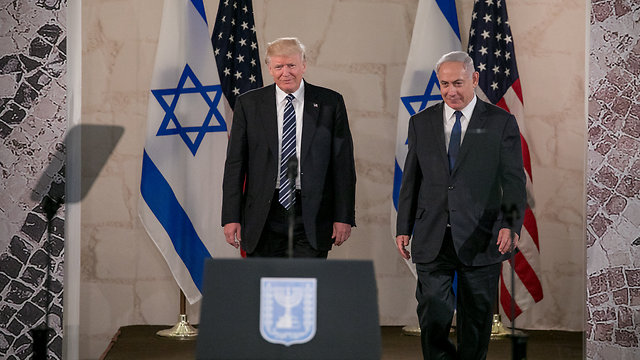

How can Israeli Left pin its peace hopes on Trump?
Op-ed: The US president’s speech at the Israel Museum adopted Prime Minister Netanyahu’s narrative unconditionally. His family, his heart and his mind cause him to identify one-sidedly with the Israeli political Right. So thinking that Trump will pressure Netanyahu is complete nonsense.
It isn’t true that Trump is the first American president to deliver a Zionist speech in the Middle East. Presidents Bill Clinton, George W. Bush and Barack Obama’s speeches were clearly Zionist too. Obama, who was vilified in Israel over his alleged appeasing approach towards the Arabs, had the courage to deliver a speech at Cairo University which was both Zionist and far-reaching in its demands towards his Muslim audience: Democratization, advancement of women, an end to discriminations, recognition of Israel, investment in modern education, and more. Unlike them, Trump didn’t demand a thing from his Arab hosts. He doesn’t care about values.

On the other hand, Trump is indeed the first American president whose speech at the Israel Museum reflects a world view from Prime Minister Benjamin Netanyahu’s school, adopting Bibi’s narrative unconditionally. The things he read out load, which were a proper expression of his understanding of the Israeli-Palestinian conflict, seemed as if they were copied without any editing from the opinion pages of the Israel Hayom free newspaper. The polls indicate as well that Netanyahu is the big winner who gained the most from Trump’s visit.
There is no need to delve into Trump’s monologues, in which he uses 500 simple words at the most (he described his visit to Yad Vashem as “amazing”), to understand that—as far as he is concerned—the required deal between the Israelis and the Palestinians is the one in which the Palestinians will give the Israelis the freedom to remain in control of the territories. Since the beginning of his term as president, Trump has given the Netanyahu government a free hand to build and expand the settlements “within their existing borders”—borders which were set by Israel of course. The settlements, according to Trump, are not an obstacle to peace. They advance peace.
In closed forums, Trump explains to his listeners that “things have never been so good for the Palestinians as they are under Israeli control.” So they should stop nagging us about a state of their own. In those same conversations, Trump doesn’t hide how much he loathes their claims about the occupation, defining them as “endless complaints.” While Bush, Clinton and Obama searched for a formula for a compromise in Jerusalem, Trump—by mere words—is moving the greater Jerusalem to Jewish-Israeli sovereignty for eternity.
Trump’s only positive approach towards the Palestinians during his visit was reduced to a few words of praise on Mahmoud Abbas’ personality. Abbas, Trump announced, is a good man who told me he wants peace. Great, fantastic. Apart from this arrogant pat on the Palestinian president’s shoulder, Trump didn’t leave the Palestinians with a shred of hope. His family, his heart and his mind cause him to identify one-sidedly with the world view of the Israeli political Right. Sometimes, Trump even stands to Netanyahu’s right.
In the best-case scenario, and likely the practical case, Trump has no plan for a realistic solution for the Israeli-Palestinian conflict and has no idea what such an agreement should or can look like, which is why he uses the empty word “deal.” In the other case, he actually does have some idea. It can be summarized as “first normalization, then an agreement”: First, almost full economic and diplomatic ties between Israel and Saudi Arabia and the oil emirates, and then discussions with the Palestinians. Discussions on some sort of autonomy, not on a sovereign state. Considering these facts, the bizarre affair that the Israeli political Left is having with Trump is puzzling and even ridiculous.
Trump left the Middle East with a sigh of relief, filled with admiration towards the ceremonial manner of 81-year-old Saudi King Salman (who he insisted on calling “Salmon”) and anger over the insufficient American television broadcasts in the hotels he stayed in. It’s spine-tingling and even funny to think that the Israeli “peace camp” has pinned its hopes on him.
You think Trump will pressure Bibi? How did you come up with this nonsense?
















